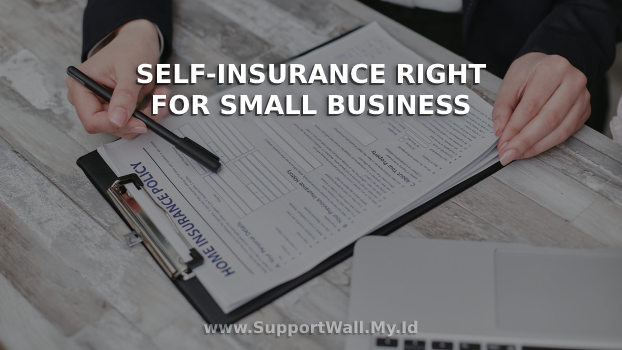Self-Insurance Right For Small Business

Small business owners face many decisions about how best to protect their business An important decision is whether to buy self-insurance right or insure yourself. While self-insurance is a smart choice for some small businesses, it’s not for everyone.
This article will explore the concept of self-insurance and help you decide if it is the right choice for your small business.
SMEs are the backbone of the economy However, running a small business involves risks such as liability claims, property damage, and other unforeseen events. One way to mitigate these risks is through insurance.
While traditional insurance is the most popular way to protect your business, self-insurance is an alternative that gives you more control over your risk management strategy. While self-insurance may be the right choice for some small businesses, it’s not for everyone Let’s take a closer look at the concept of self-insurance.
What is Self-Insurance?
Self-insurance is a risk management strategy in which a company assumes financial responsibility for any losses or claims incurred.
Rather than purchasing insurance from a third party, the company provides funds to cover possible losses. Auto insurance is typically used for property damage risks such as liability claims, worker injury claims and property damage.
Benefits of self-insurance for small businesses
Self-insurance has several advantages for small businesses, including:
- Cost Savings: Self-insurance saves premiums that would otherwise be paid to insurance companies.
- Control: Self-insurance gives the company greater control over its risk management strategy, including the ability to customize coverage and claims management.
- Financial Stability: Self-insurance can provide financial stability by allowing a company to retain funds that would otherwise have been paid in premiums and invest them instead.
- Claims Management: Self-insurance gives businesses more control over their claims management process. This includes the ability to select your own claims adjuster.
- Tax Benefits: Self-insurance can provide tax benefits by allowing a company to deduct losses as a business expense.
Disadvantages of Self-Insurance for Small Business
Self-insurance also has some disadvantages, including:
- Financial Risk: Self-insurance exposes your business to greater financial risk as you take financial responsibility for any losses incurred.
- Limited Coverage: Auto insurance may not offer the same level of coverage as traditional insurance, especially for catastrophic events.
- Regulatory compliance: Self-insurance requires compliance with state and federal regulations, which can be complex and time-consuming.
- Administrative costs: Self-insurance may require significant administrative costs, such as hiring claims adjusters and risk management staff.
- Cash flow: Self-insurance requires a cash reserve to cover losses. This can put pressure on the cash flow of small businesses.
Also Read: Health Care Tax Credit for Small Business
Is Self-Insurance Right for Your Small Business?
While self-insurance is a smart choice for some small businesses, it’s not for everyone Consider the following factors to determine if self-insurance is right for your small business:
1. Risk Tolerance
Self-insurance is a good choice if you have a high tolerance for risk and can absorb losses without affecting your operations.
2. Financial Stability
Self-insurance is appropriate if your business is financially stable and has funds available to cover potential losses.
3. Type of Business
The type of business you run is an important factor in determining whether auto insurance is right for you some companies.
For example, businesses in high-risk industries may struggle to obtain affordable traditional insurance. In such cases, self-insurance may be a wiser option other companies.
For example, people with high-value assets or who rely heavily on a small number of key employees can benefit from the greater control and flexibility that self-insurance can provide.
4. Size of Business
The size of your business is also an important factor in determining whether auto insurance is right for you.
Smaller businesses may find it more difficult to obtain insurance, as individual losses are at greater risk of impacting their financial stability Larger companies, on the other hand, may have the necessary resources and financial stability to effectively self-insure.
5. Regulatory Compliance
As previously mentioned, self-insurance requires compliance with state and federal regulations.
These regulations can be complex and time-consuming, requiring organizations to invest significant time and resources to maintain compliance. If your business does not have the resources or expertise to handle this regulatory burden, traditional insurance may be a better fit.
State and federal regulations require self-insurers to maintain adequate reserves to cover potential losses, file regular reports with state regulators, and comply with various financial, operational, and administrative must meet the requirements of.
These requirements can vary widely from state to state and may include reserve requirements, claims processing procedures, and reporting requirements.
Conclusion
While self-insurance is a smart choice for some small businesses, it’s not for everyone Small business owners should carefully consider their risk tolerance, financial stability, type and size of business, and regulatory compliance requirements before deciding whether self-insurance is the right choice.
If you choose to self-insure, it is important to develop a comprehensive risk management strategy that includes setting up cash reserves, hiring claims adjusters and risk management personnel, and complying with state and federal regulations.
This allows you to effectively manage your risks while better managing your insurance strategy.




